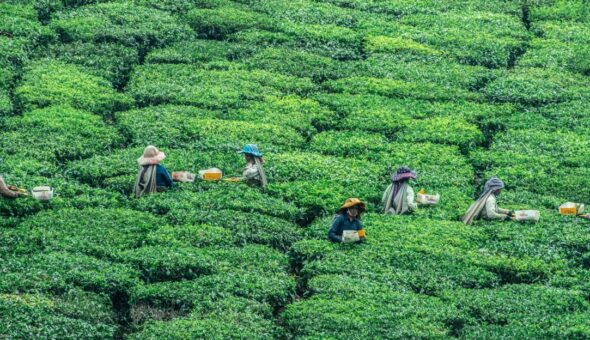A strange side effect of a global pandemic for many of us is that our lives suddenly become very small. Confined to our homes, we turn inwards, focusing on the new domestic challenges of the situation - taking care of children and relatives, juggling a newly merged home and work life, or even just going to the supermarket - which suddenly seem all-consuming. But Professor Andy Crane asks that we spare a thought for workers in global supply chains. In this piece he explores the effect of lockdowns on the economy and supply chains, and the ensuing human cost.
Our lives are being rapidly and fundamentally reshaped by COVID-19. Waking up to the new normal of staying home, keeping our distance, and working and socializing almost entirely virtually takes some getting used to. But let’s not make any mistake. We are among the lucky ones.
Most of the people reading this will have a job or a scholarship, or a student loan that won’t suddenly stop paying them. Even those that don’t, will likely be living in countries with a more-or-less functioning working welfare system that should buffer them from extreme hardship. We may well know people that get sick or end up dying from COVID-19 – and yes, maybe a few of us will succumb too. But we have a better than average chance of getting through this with the benefit of our public or private health systems - however imperfect, under-resourced, and overstretched they might be.
As researchers or practitioners concerned with sustainable business, one of the issues at the top of our minds should be the effects of COVID-19 on the millions of precarious workers toiling in global supply chains, who have few if any of the protections that we enjoy. Most of these workers experience poor working conditions at the best of times. But now, it is the worst of times. Lockdowns across the globe have prompted brands to cancel their orders – and even to refuse to pay for existing orders now that their stores are closed and their warehouses full.
The garment industry which employs some 60 million workers across the globe is among one of the worst affected. As one recent report put it, the delays and cancellations of orders “has forced many suppliers to lay off or suspend workers in garment factories, without any social protection, or paid leave, pushing an already precarious group of workers to greater economic vulnerabilities.” The majority of such workers do not have permanent jobs or contracts, many work on piece rates rather than drawing a regular salary, and even where some minimal health or social protections are available the workers often do not have access to them because they do not pay contributions.
Although the bulk of such workers are in developing countries, there are also similar problems closer to home, especially for zero-hour contract workers and the millions of casual agency workers keeping products and materials flowing up and down the value chain. In many industries, the sudden rupture brought on by COVID-19 is making this expendable workforce destitute.
Even worse affected are those already experiencing more extreme forms of exploitation such as modern slavery. As industries across the globe contract, there is a strong possibility that these forms of exploitation will flourish as people in precarious employment become ever more desperate to find work. One of the main concerns for workers trapped in modern slavery is that they will be put at extreme risk of infection because they will end up in the kind of jobs that others don’t want to do, will be paid even less, and simply won’t have access to protective equipment or the ability to social distance. And with labour inspections being postponed, even from an already low base, such exploitation is likely to go undetected.
There is also a very real – but often overlooked - possibility that exploiters who control workers in forced labour situations will be able to leverage the shuttering of industries like construction, cleaning, and catering due to COVID-19 to force workers into even worse debt bondage. Exploiters will still be able to charge workers exorbitant fees for accommodation and food, but will likely be paying them less and offering them even less work in order to pay off their debts. Workers could quickly find themselves in ever more dire circumstances and be forced into greater risk and more serious forms of illegality.
So, what is to be done? Researchers and activists concerned about labour and human rights abuses in global supply chains have long argued for the need for different models of allocating responsibility and ensuring accountability from brands for the workers in their supply chains. But it often takes a major shock to shift the needle. For instance, when over 1100 workers died in the Rana Plaza factory collapse in Bangladesh in 2011, it quickly led to the establishment of new ways of tackling factory safety through the Bangladesh Accord.
Are we now facing possibly an ever greater shock that will see potentially tens or even hundreds of thousands of workers left destitute and dying as a result of brands’ negligence?
The causal trail of evidence will be more difficult to trace compared with picking up brand labels from the rubble of a collapsed building. But as researchers, practitioners, activists, or even just as concerned citizens, we need to focus our attention on identifying the human costs of such supply chain shocks and devising solutions to better safeguard the workers on whom we all depend – but so often fail to protect.
This was originally posted as a RRBM blog.
Photo by Carlos Ibáñez on Unsplash
Respond



